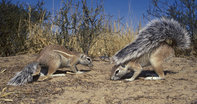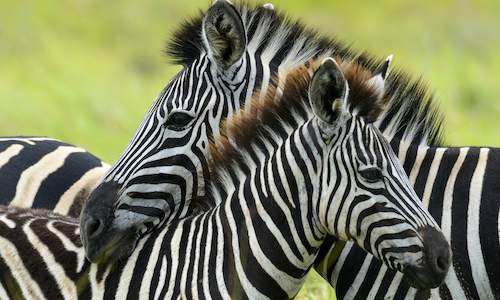
Name
Cape ground squirrel (Xerus inauris)Appearance
The Cape ground squirrel is a rodent endemic to South Africa. It has a coarse, cinnamon coloured coat with a white stripe running down either side of its body. Its white underparts and fluffy, fan-like tail have white tipped, black based hairs. In winter, the Cape ground squirrel grows a longer coat for warmth. It weighs up to one kilogram and measures 450 mm in length.Cape Ground Squirrel Diet
Being predominantly herbivorous, the Cape ground squirrel feeds on roots and bulbs dug up with its front teeth and claws, and at times eats termites in summer. It gnaws and nibbles at its food in the typical rodent manner with its sharp incisors.Cape Ground Squirrel Breeding
Female reach sexual maturity at the age of six months, although those older than one year are allowed to reproduce. Only one female per social group can be in her oestrus cycle at a time. After a gestation period of about 48 days, two to six young of 20 grams each are birthed naked and altricial. Living in a colony, females share the task of taking care of the young.Dominant females accept and tolerate only one adult male as the main breeding partner. The young stay with the females for two years before dispersing to colonies in neighbouring territories. This pattern of dispersal strengthens gene flow and the development of new colonies.
 Learning about the mammals of South Africa is now so much easier for all South Africans - SouthAfrica.co.za is an excellent source of inform...
Learning about the mammals of South Africa is now so much easier for all South Africans - SouthAfrica.co.za is an excellent source of inform...